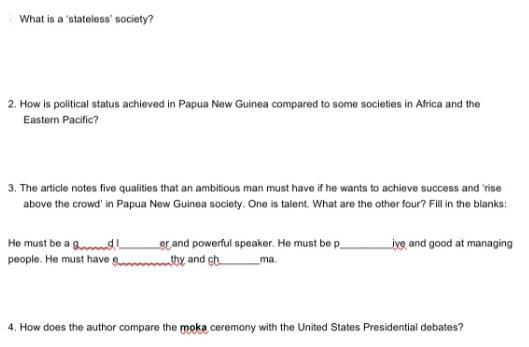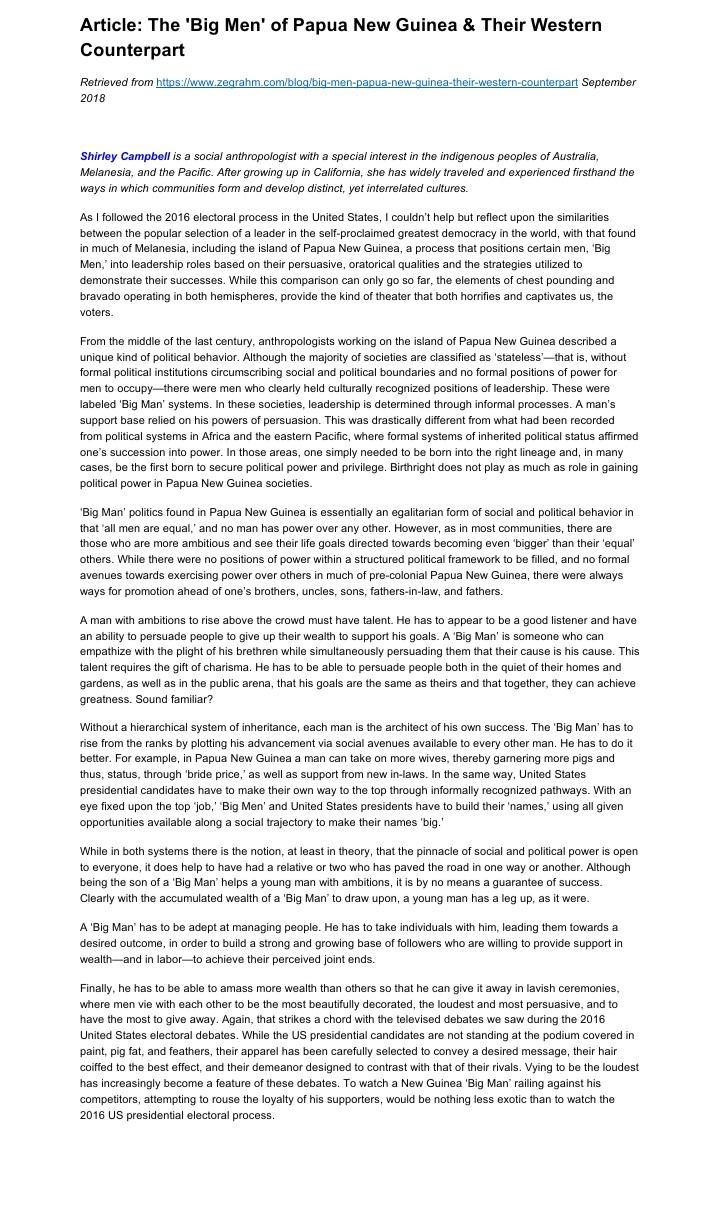Answered step by step
Verified Expert Solution
Question
1 Approved Answer
What is a 'stateless' society? 2. How is political status achieved in Papua New Guinea compared to some societies in Africa and the Eastern


What is a 'stateless' society? 2. How is political status achieved in Papua New Guinea compared to some societies in Africa and the Eastern Pacific? 3. The article notes five qualities that an ambitious man must have if he wants to achieve success and rise above the crowd in Papua New Guinea society. One is talent. What are the other four? Fill in the blanks: He must be a gd! people. He must have g grand powerful speaker. He must be p thy and ch ma. ive and good at managing 4. How does the author compare the mok ceremony with the United States Presidential debates? Article: The 'Big Men' of Papua New Guinea & Their Western Counterpart Retrieved from https://www.zegrahm.com/blog/big-men-papua-new-quinea-their-western-counterpart September 2018 Shirley Campbell is a social anthropologist with a special interest in the indigenous peoples of Australia, Melanesia, and the Pacific. After growing up in California, she has widely traveled and experienced firsthand the ways in which communities form and develop distinct, yet interrelated cultures. As I followed the 2016 electoral process in the United States, I couldn't help but reflect upon the similarities between the popular selection of a leader in the self-proclaimed greatest democracy in the world, with that found in much of Melanesia, including the island of Papua New Guinea, a process that positions certain men, 'Big Men,' into leadership roles based on their persuasive, oratorical qualities and the strategies utilized to demonstrate their successes. While this comparison can only go so far, the elements of chest pounding and bravado operating in both hemispheres, provide the kind of theater that both horrifies and captivates us, the voters. From the middle of the last century, anthropologists working on the island of Papua New Guinea described a unique kind of political behavior. Although the majority of societies are classified as 'stateless-that is, without formal political institutions circumscribing social and political boundaries and no formal positions of power for ... men to occupy-there were men who clearly held culturally recognized positions of leadership. These were wwww labeled 'Big Man' systems. In these societies, leadership is determined through informal processes. A man's support base relied on his powers of persuasion. This was drastically different from what had been recorded from political systems in Africa and the eastern Pacific, where formal systems of inherited political status affirmed one's succession into power. In those areas, one simply needed to be born into the right lineage and, in many cases, be the first born to secure political power and privilege. Birthright does not play as much as role in gaining political power in Papua New Guinea societies. 'Big Man' politics found in Papua New Guinea is essentially an egalitarian form of social and political behavior in that 'all men are equal,' and no man has power over any other. However, as in most communities, there are those who are more ambitious and see their life goals directed towards becoming even 'bigger than their 'equal' others. While there were no positions of power within a structured political framework to be filled, and no formal avenues towards exercising power over others in much of pre-colonial Papua New Guinea, there were always ways for promotion ahead of one's brothers, uncles, sons, fathers-in-law, and fathers. A man with ambitions to rise above the crowd must have talent. He has to appear to be a good listener and have an ability to persuade people to give up their wealth to support his goals. A 'Big Man' is someone who can empathize with the plight of his brethren while simultaneously persuading them that their cause is his cause. This talent requires the gift of charisma. He has to be able to persuade people both in the quiet of their homes and gardens, as well as in the public arena, that his goals are the same as theirs and that together, they can achieve greatness. Sound familiar? Without a hierarchical system of inheritance, each man is the architect of his own success. The 'Big Man' has to rise from the ranks by plotting his advancement via social avenues available to every other man. He has to do it better. For example, in Papua New Guinea a man can take on more wives, thereby garnering more pigs and thus, status, through 'bride price,' as well as support from new in-laws. In the same way, United States presidential candidates have to make their own way to the top through informally recognized pathways. With an eye fixed upon the top 'job, Big Men' and United States presidents have to build their 'names, using all given opportunities available along a social trajectory to make their names 'big.' While in both systems there is the notion, at least in theory, that the pinnacle of social and political power is open to everyone, it does help to have had a relative or two who has paved the road in one way or another. Although being the son of a 'Big Man' helps a young man with ambitions, it is by no means a guarantee of success. Clearly with the accumulated wealth of a 'Big Man' to draw upon, a young man has a leg up, as it were. A 'Big Man' has to be adept at managing people. He has to take individuals with him, leading them towards a desired outcome, in order to build a strong and growing base of followers who are willing to provide support in wealth and in labor-to achieve their perceived joint ends. Finally, he has to be able to amass more wealth than others so that he can give it away in lavish ceremonies, where men vie with each other to be the most beautifully decorated, the loudest and most persuasive, and to have the most to give away. Again, that strikes a chord with the televised debates we saw during the 2016 United States electoral debates. While the US presidential candidates are not standing at the podium covered in paint, pig fat, and feathers, their apparel has been carefully selected to convey a desired message, their hair Unite best offer coiffed to the best effect, and their demeanor designed to contrast with that of their rivals. Vying to be the loudest has increasingly become a feature of these debates. To watch a New Guinea 'Big Man' railing against his competitors, attempting to rouse the loyalty of his supporters, would be nothing less exotic than to watch the 2016 US presidential electoral process.
Step by Step Solution
There are 3 Steps involved in it
Step: 1
1 Stateless Society A stateless society refers to a social and political organization that lacks formal political institutions government structures a...
Get Instant Access to Expert-Tailored Solutions
See step-by-step solutions with expert insights and AI powered tools for academic success
Step: 2

Step: 3

Ace Your Homework with AI
Get the answers you need in no time with our AI-driven, step-by-step assistance
Get Started


